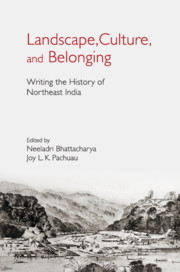Book contents
- Frontmatter
- Contents
- List of Figures
- Acknowledgements
- Introduction
- I Borders and Beyond
- 1 India's Spatial History in the Brahmaputra–Meghna River Basin
- 2 The Birth of the Ryot: Rethinking the Agrarian in British Assam
- 3 Embracing or Challenging the ‘Tribe’? Dilemmas in Reproducing Obligatory Pasts in Meghalaya
- II Surveys and Explorations
- III Ethnography, History, and the Politics of Representation
- IV Law, State, and Practices of Governance
- V Cultural Dialogues
- Notes on Contributors
- Index
3 - Embracing or Challenging the ‘Tribe’? Dilemmas in Reproducing Obligatory Pasts in Meghalaya
from I - Borders and Beyond
Published online by Cambridge University Press: 26 April 2019
- Frontmatter
- Contents
- List of Figures
- Acknowledgements
- Introduction
- I Borders and Beyond
- 1 India's Spatial History in the Brahmaputra–Meghna River Basin
- 2 The Birth of the Ryot: Rethinking the Agrarian in British Assam
- 3 Embracing or Challenging the ‘Tribe’? Dilemmas in Reproducing Obligatory Pasts in Meghalaya
- II Surveys and Explorations
- III Ethnography, History, and the Politics of Representation
- IV Law, State, and Practices of Governance
- V Cultural Dialogues
- Notes on Contributors
- Index
Summary
Introduction: The Past of Non-Historians
This essay is a reflection on coming to terms with the category ‘tribal’ through a decade and a half of researching the Northeast. As a non-historian who has worked on issues as diverse a s agricultural change, pro-development groups, Northeast migrants, race and the media, and inter-ethnic relations in urban India, I come to this essay from a position of puzzlement: What am I supposed to do with the category ‘tribal’? Challenge it? Adopt it? Stand up for it? Further, what are ‘we’, as scholars engaged with the Northeast professionally and personally, to do with the category? On the one hand, scholars are finely attuned to the category as a thin colonial construction, and scarcely a seminar or special issue goes by without a call to challenge the category, deconstruct it, rethink it, or lay bare its precarious assumptions. On the other hand, the category is used by those subject to it, is desired by those who do not have it, and is resolute in a great deal of scholarship on the region as evidence for an ongoing ‘identity crisis’ that offers a ready-made logic for almost everything.
As many authors have pointed out, including many in this volume, communities of the region, particularly in the hill areas, are largely de-historicized in this process: history is for the valleys, anthropology for the hills. As such, the past is told as a series of recent encounters: communities in the region emerged out of primitive pasts through contact with colonial authorities and missionaries, were categorized and subject to forms of colonial subjugation which dramatically altered their previously unchanging lives, and were then forced to survive in the modern Indian state. Recent scholarship has posed a major challenge to these standard practices of understanding the region. Despite these positive shifts, I still find the category challenging, particularly as much of my academic life has required me to explain ‘tribal’ for audiences outside the Northeast, and often outside South Asia entirely. Further, having used race as a way of analysing the politics of integration, solidarity, and representation for Northeast communities in India, I have noted a fascinating reaction from scholars anxious about the use of race lest it transgress the tribal/non-tribal distinction in the region.
- Type
- Chapter
- Information
- Landscape, Culture, and BelongingWriting the History of Northeast India, pp. 66 - 86Publisher: Cambridge University PressPrint publication year: 2019
- 3
- Cited by



